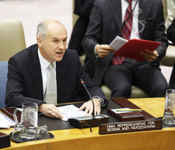Bosnia faces the most serious crisis since 1995
Evelina Topalova, May 12, 2011
 The international community should not neglect the situation in Bosnia and Herzegovina (BiH) which is facing the most serious crisis since the end of the 1992-1995 war. The warning came from High Representative Valentin Inzko during debates on the country at the UN Security Council on May 9th. He stressed that seven months after the general elections BiH is still lacking central-level government, faces a stalled economy and attempts by Bosnian Serbs to undermine the Dayton Peace Agreement.
The international community should not neglect the situation in Bosnia and Herzegovina (BiH) which is facing the most serious crisis since the end of the 1992-1995 war. The warning came from High Representative Valentin Inzko during debates on the country at the UN Security Council on May 9th. He stressed that seven months after the general elections BiH is still lacking central-level government, faces a stalled economy and attempts by Bosnian Serbs to undermine the Dayton Peace Agreement.
Inzko lashed out mainly on Republika Srpska (RS) which, along with the Federation of BiH (the Muslim-Croat Federation), forms BiH under the Dayton agreement. The planned RS referendum on the legitimacy of BiH Court and Prosecutor's Office, according to him, will have a major impact on the functionality and stability of the country despite Bosnian Serbs' reassurances that it will not be a prelude to possible secession.
Last week the High Representative gave RS authorities a seven-day deadline to change their mind on the referendum and threatened that if they failed to do so he would halt it. The deadline expires on May 12th. Inzko is entitled to exclusive powers that give him the right to impose laws and sanction politicians and persons, believed to undermine the Dayton Peace Agreement. His predecessors have resorted to these powers in many cases.
Bosnian Serbs remain defiant, though, and say they do not intend to give up the referendum plan. At least for the time being. Republika Srpska President Milorad Dodik however hinted on May 10th, for the first time, that there was a possibility to postpone the referendum for up to three months in case a dialogue on the judiciary is initiated and guarantees are given that shortcomings in the work of the two controversial judicial institutions will be eliminated.
He threatened that RS will respond if the High Representative resorted to his powers but did not elaborate. Local media speculate that one of the possible options in case of sanctions is Bosnian Serbs to leave all central-level institutions.
The International Crisis Group has also joined the warnings about the situation in  Bosnia. In a report, published on May 6th, it assesses that the country is facing the most serious crisis since the end of the war and warns that if the situation pertains violence could appear as a near prospect. The NGO recalls that Bosnia is still lacking central government and that the Federation of BiH has elected a government without the consent of the main Croat parties.
Bosnia. In a report, published on May 6th, it assesses that the country is facing the most serious crisis since the end of the war and warns that if the situation pertains violence could appear as a near prospect. The NGO recalls that Bosnia is still lacking central government and that the Federation of BiH has elected a government without the consent of the main Croat parties.
The international community needs to step back from over-involvement in local politics, the document reads. It also says that the EU has lost credibility due to its inability for the past nine months to strengthen its presence in Bosnia.
"Virtually all international institutions in Bosnia have lost authority; many, including the Office of the High Representative, are seen as favouring one side or party," the ICG estimates.
In conclusion, the NGO recommends several steps - the international community to call a high-level conference to set its goals in Bosnia, to reconfirm its commitment to the Dayton Peace Agreement, to limit the High Representative's interference in local politics, to draft a plan to relocate his office outside Bosnia and to give the EU the capacities to become a leading actor.
 Bakir Izetbegovic, Andrej Plenkovic | © Council of the EU
Bakir Izetbegovic, Andrej Plenkovic | © Council of the EU Aleksandar Vucic, Recep Tayyip Erdogan | © Serbian Presidency
Aleksandar Vucic, Recep Tayyip Erdogan | © Serbian Presidency Jean-Claude Juncker, Zoran Zaev | © European Commission
Jean-Claude Juncker, Zoran Zaev | © European Commission